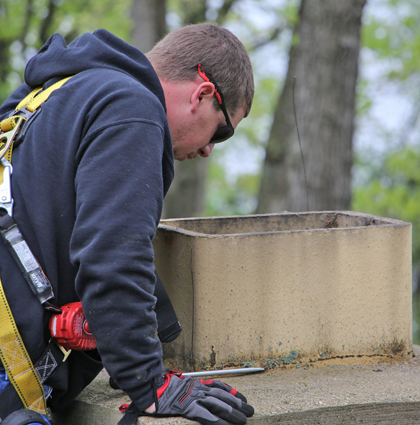Cooler Weather is On Its Way: Inspect Your Chimney or Stove Now
 While your family is enjoying the warmth of a crackling fire, your chimney is hard at work venting soot, smoke and other contaminants from your fireplace or stove. But creosote buildup, obstructions, cracks in the flue, damaged chimney flashing and missing bricks are some of the common issues that can lead to fire and health hazards. Since many chimney problems are not easily noticeable, only an in-depth evaluation by a certified chimney sweep can detect these issues before they grow into bigger problems.
While your family is enjoying the warmth of a crackling fire, your chimney is hard at work venting soot, smoke and other contaminants from your fireplace or stove. But creosote buildup, obstructions, cracks in the flue, damaged chimney flashing and missing bricks are some of the common issues that can lead to fire and health hazards. Since many chimney problems are not easily noticeable, only an in-depth evaluation by a certified chimney sweep can detect these issues before they grow into bigger problems.
The Importance of an Annual Chimney or Stove Inspection
An annual chimney or stove inspection is very important because it helps to determine if it’s safe for use. Let’s look at some of the potential problems which can affect your chimney or stove and how they can be detected during a professional inspection:
Physical Damage – Even though masonry chimneys are built strong and sturdy to withstand extreme environmental conditions, continuous exposure can lead to internal and/or external physical damage. Damaged or missing mortar, missing bricks, damaged chimney flashing and holes or cracks in the flue are some of the problems that can occur. Exposure to rains and storms can break down the bricks and mortar allowing water to penetrate. This results in spalling or loose bricks, which can eventually deteriorate the integrity of the chimney structure. Also, hail, strong winds and thermal expansion can damage the chimney flashing, a leading cause of roof leaks.
Creosote Buildup – As a fireplace or stove burns, it produces creosote and other byproducts as a result of the chemical reaction during the combustion of liquid and solid fuels. As you continue to use your fireplace or stove, additional layers of creosote stick to the chimney, stove and flue. When the creosote becomes too thick, it can ignite causing a fire. During an inspection, a chimney sweep evaluates the creosote levels. The Chimney Safety Institute of America (CSIA) recommends cleaning chimneys and stoves when the creosote level is 1/8” to prevent a fire.
 Obstructions – Over time, your chimney may accumulate debris like twigs, debris and bird’s nests that obstruct the chimney. Even a small blockage can affect the performance and prevent toxic gases, heat, and smoke from escaping your home. This can lead to poor indoor air quality and even carbon monoxide poisoning.
Obstructions – Over time, your chimney may accumulate debris like twigs, debris and bird’s nests that obstruct the chimney. Even a small blockage can affect the performance and prevent toxic gases, heat, and smoke from escaping your home. This can lead to poor indoor air quality and even carbon monoxide poisoning.
Certified Chimney Sweep
With colder weather approaching, it is vital to inspect your chimney or stove now. This is a crucial step to ensure your heating appliances are in good working order and can perform its job of keeping your family warm and safe. The chimney sweeps at Burlington Fireplace and Solar are certified by the CSIA and follow the guidelines established by the National Fire Protection Association (NFPA). These qualified professionals have the skills, knowledge, experience, and equipment required to perform an in-depth inspection, cleaning, and any necessary repairs.
